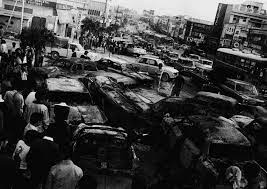On this day in 1970, a spontaneous uprising against U.S. military occupation broke out in Koza, Okinawa, Japan after an American drunk driver struck a local pedestrian. Approximately 60 Americans and 27 Okinawans were injured, and dozens of cars with American license plates were torched.
Following Japan's defeat in World War II, the country was occupied by Allied forces and governed under martial law. While most of Japan regained its independence in April 1952, the Okinawa Prefecture was to remain under U.S. military occupation for another twenty years.
Prior to the events of December 20th, three Americans had been acquitted via court martial after striking and killing an Okinawa civilian. This incident fueled the growing discontent of Okinawans with the standard status of forces that exempted U.S. servicemen from Okinawan justice.
On December 20th, 1970, a drunk U.S. serviceman struck an Okinawan pedestrian in the city of Koza. A crowd quickly surrounded the car and the policemen who had arrived, demanding that this incident not also be swept under the rug.
When American MPs arrived and attempted to pull the driver away, the protest turned violent, with thousands gathering to try to prevent the driver from leaving. By the end of the night, dozens of cars with American license plates had been torched and approximately 60 Americans and 27 Okinawans had been injured.
Megathreads and spaces to hang out:
- ❤️ Come listen to music and Watch movies with your fellow Hexbears nerd, in Cy.tube
- 💖 Come talk in the New Weekly Queer thread
- 💛 Read and talk about a current topics in the News Megathread
- ⭐️ September Movie Nominations ⭐️
reminders:
- 💚 You nerds can join specific comms to see posts about all sorts of topics
- 💙 Hexbear’s algorithm prioritizes comments over upbears
- 💜 Sorting by new you nerd
- 🌈 If you ever want to make your own megathread, you can reserve a spot here nerd
- 🐶 Join the unofficial Hexbear-adjacent Mastodon instance toots.matapacos.dog
Links To Resources (Aid and Theory):
Aid:
Theory:


A lot of social media reminds me of what the world must've been like in the seventeenth or eighteenth century or something. Like your main source of news of the outside world is some random merchant who is "just passing through." Like, if he tells you oh Louis XIV eats children to prolong his life so that he can stay king, what are you gonna do, look it up? You can't even read and have never left the manor, meanwhile he's been to Lyon so surely he knows what he's talking about.
Now instead of passersby spinning long yarns that aren't based in anything resembling reality we have influencers just spitting out whatever thought crosses their mind and we all absorb it because they have 700k followers and you have like 80 so surely they know what they're talking about. Even some of our favorite leftist influencers - I mean who the hell are some of these people? Some of them have no reason to be considered an authority. Why don't I start making video essays on youtube or something? I have more of a claim on being an "authority" on socialism than like most of the people I listen to...
From what I understand pamphlets were extremely popular - Usually one page printed pamphlets that would often have a religious or political message along with a few jokes. Folks would spread them around Europe, read them out loud in pubs and public squares. And people, even relatively poor people, did travel. Pilgrimages weren't as much of a thing in post-revolution France, but all the way back to antiquity people would go on pilgrimages all over the place, with a fairly well developed infrastructure supporting what were essentially tourists, right down to pilgrim badges that served as tourist souvenirs.
There were also letter readers and letter writers. Folks who weren't literate would ask or hire a literate person to write letters to friends and colleagues, and when letters arrived for them they'd have a reader read it for them. And basic literacy was more wide-spread than generally reckoned. Interestingly; more people could read than write, as writing was a separate skill far fewer people had a chance to practice.
Also also also, once the movable type press was invented there was far more written material going around, and with it a comensurate spread in news, fiction, porn, religious tracts, all kinds of things.
Generally speaking, folks in the past traveled, communicated, and shared information more than they're generally credited with. Prior to the industrial revolution people often had a great deal of free time during the summer and after harvest.
do you have any sources for this stuff? Because my understanding was that the post was extremely unreliable until the late 1700s, and while the news was there, it's availability fluctuated based on who was in charge, and in any case, regular periodicals weren't really widespread until the improvement of the post and the road system into the 1700s, and their circulation remained small until the steam press in 1814. And most of those improvements were happening in England first with France usually following. So the rest of Europe would've been behind (not sure about other parts of the world).